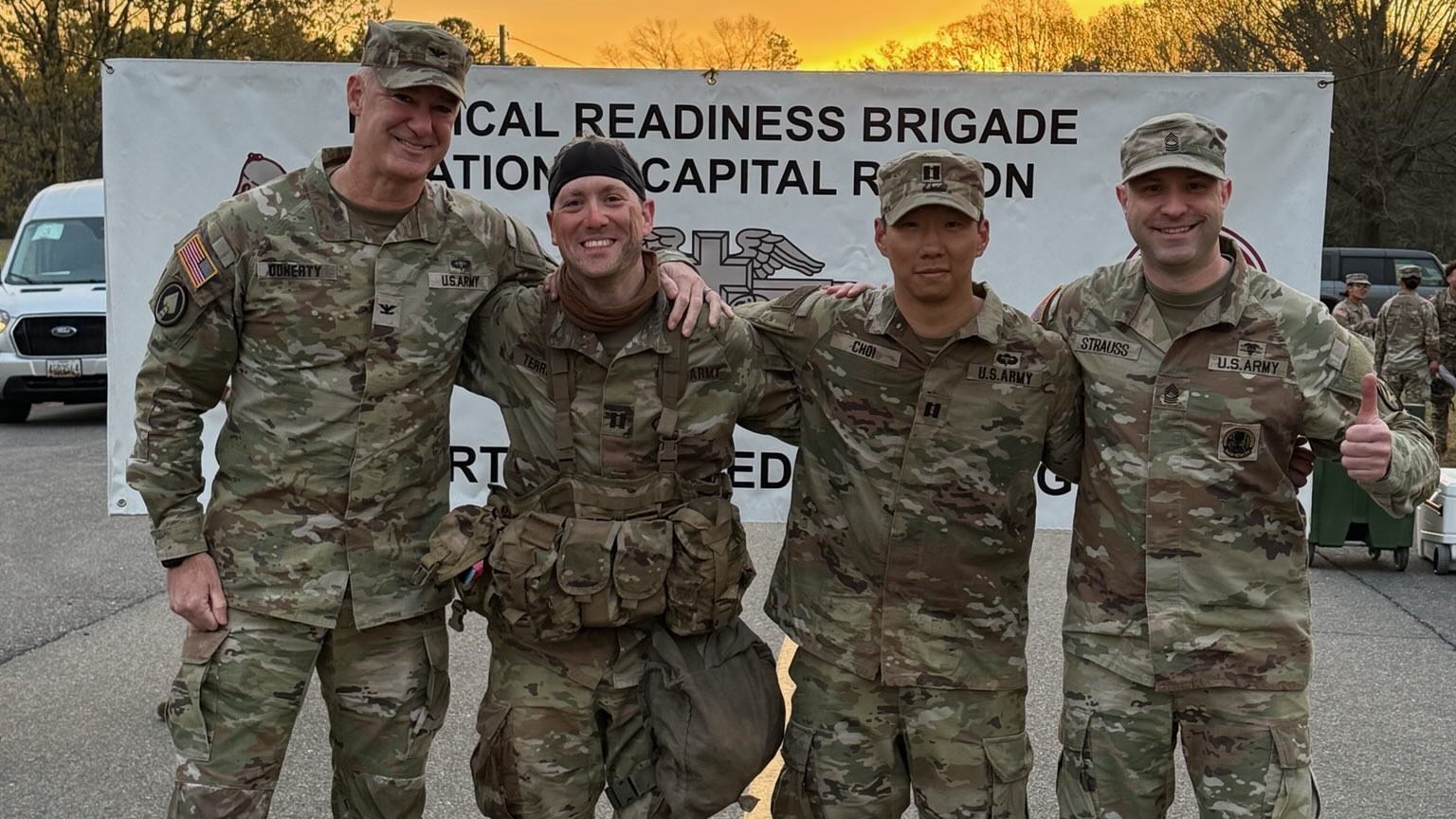April 14, 2025 | By Paul Lagasse, Medical Research and Development Command
FORT DETRICK, Md. – Four soldiers from the U.S. Army Medical Research Institute of Chemical Defense and U.S. Army Medical Research Institute of Infectious Diseases earned the prestigious Expert Field Medical Badge following a grueling five-day competition earlier this month at Fort Walker, Virginia.
The competition tested the soldiers' combat skills as well as their ability to deliver cutting-edge life-saving medical care in a variety of austere scenarios – vital skills for ensuring our forces remain resilient, adaptable, and lethal.
Brig. Gen. Lance Raney, commanding general of Medical Readiness Command-East, pinned the EFMB on Capt. Seung Choi and Capt. James Terrell of USAMRICD and Staff Sgt. David Anandzi and Capt. Kayla Fantone of USAMRIID at a ceremony following the competition on April 2. Fantone had the additional distinction of getting perfect scores on all her tests – popularly referred to as earning the EFMB with “No Blood.”
A total of seven Defense Health Agency Research and Development-Medical Research and Development Command teammates from USAMRIID, USAMRICD, and the Walter Reed Army Institute of Research competed in the event, which consists of an expert physical fitness assessment, a written test, a 12-mile ruck march, exercises for evaluating evacuation and warrior skills and day and night land navigation exercises. The Army's Medical Center of Excellence, which developed the EFMB tests, describes their purpose as measuring "a soldier's physical fitness and ability to perform to standards of excellent in a broad spectrum of critical medical, evacuation and warrior skills."
The EFMB is notoriously hard to earn; the overall pass rate is typically less than 30%. Earning the badge is a demonstration of the recipients’ achievement of a high standard of readiness.
“EFMB testing is designed to be stressful,” says Choi, a research biochemist who earned the EFMB on his first attempt. “It’s often just you and a stone-faced grader while you navigate and perform the tasks in front of you. It could be warm and sunny outside, but the air is cold and stiff, the testing area is completely silent, and you find yourself second-guessing your approach, your knowledge, and your instincts. There’s almost no room for error, and any little mistake could potentially be your last.”
The competitors singled out the cadre for praise for their support throughout the training and competition weeks. The sharing of knowledge and expertise among peers is an important technique for improving warfighter resilience, adaptability, and lethality.
“The instructors really wanted all of us to succeed,” says Terrell, a research biochemist for whom this was his second attempt to earn the badge. “They spent lots of extra time with us in study halls, and if anybody had any questions, they were out there with us. They were also at the testing site 24/7. It's not like they went to a hotel or back to their house every night. They were going through it with us, which was really cool.”
Fantone, a microbiologist who earned the EFMB on her first attempt, says that having a good attitude, being open to learning and putting in a lot of effort are crucial for improving the odds of success – characteristics that are vital for meeting the Army’s high standards of readiness for both individuals as well as at the unit level. “The EFMB will humble you and find your weaknesses,” says Fantone. “But that's what I like about it. It was fun because you actually learn your weaknesses as well as your strengths out there, and discover what you need to work on.”
A common theme among EFMB competitors is how the experience energizes them to tackle the next career challenge and continue honing and improving their warfighter and medical skill sets, such as pursuing Air Assault, Airborne, or Ranger badges.
“You get such a drive to do it while you're there, you have to forget about everything else,” says Anandzi, the NCO In Charge of USAMRIID’s Pathology Division. “There is so much to remember in such a short period of time that once you start to realize that you can actually do this, then it's like oxygen. You just want to go back and just keep it. You practice so much that you can’t get it out of your head afterward!”
Following the award ceremony, MRDC’s Command Sgt. Maj. Michael Dills presented Anandzi, Choi, Fantone, and Terrell with the Sergeant Major’s and Commander's Coins for their accomplishments. “I think everybody who went through the competition had a rewarding experience,” says Terrell. “It didn't seem to me like any of the soldiers who didn’t earn the badge had any reservations about going again. All of them had the shared mentality of, ‘I will definitely be back!’”



